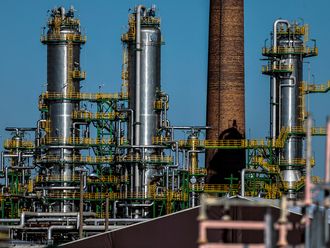Houston
President Donald Trump started a tug of war with the oil market and lost the first round.
Hedge funds extended wagers that oil and gasoline prices will rise days before Trump blasted Opec on Twitter for making oil prices “artificially Very High.” They were vindicated by a second straight week of gains that threaten to wipe out some of the household savings from Trump’s tax cuts.
WTI for May delivery gained 9 cents, or 0.1 per cent, to settle at $68.38 a barrel in New York. The contract expired on Friday. It rose 1.5 per cent for the week, after an 8.6 per cent jump the week before.
Brent crude for June delivery fell about 69 cents at the time of the tweet, before closing 28 cents higher at $74.06 a barrel in London. Brent was up 2 per cent for the week.
US producers deployed five more oil rigs this week, pushing the total number of active equipment to 820, the highest since March 2015, according to data from Baker Hughes.
“Gasoline prices are rising in the US ahead of the summer driving season and he wants someone to blame,” said Phil Flynn, a senior market analyst at Price Futures Group Inc in Chicago. As Trump tries to push prices down and Opec pushes them higher, that “creates an opportunity for traders,” he said.
Gasoline prices at the pump have climbed on the back of rising demand and increasing oil costs for refineries. While Trump criticised Opec for bolstering prices in his tweet Friday, the rally has been largely supported by geopolitical tensions that he has exacerbated, such as fears that sanctions against Iran may be renewed.
“Without a doubt there’s probably more gas price increases yet to come,” said Patrick DeHaan, head of petroleum analysis at GasBuddy.com. “For maybe a couple more weeks prices may move higher.”
DeHaan sees retail gasoline prices reaching $3 a gallon for a third to half of the US in the coming weeks, up from an average of $2.76 currently.
Global oil demand growth in the first three months of this year is forecast to reach 2.55 million barrels a day, the strongest year-on-year expansion since 2010, Goldman Sachs Group Inc said in a note April 19. Higher prices will only cause a “modest deceleration” in gasoline demand, Goldman said.
“Production challenges in US shale are emerging,” said Paal Kibsgaard, chief executive officer of Schlumberger Ltd., the world’s biggest provider of oilfield services. It’s “increasingly likely that the industry will face growing supply challenges over the coming year.”












